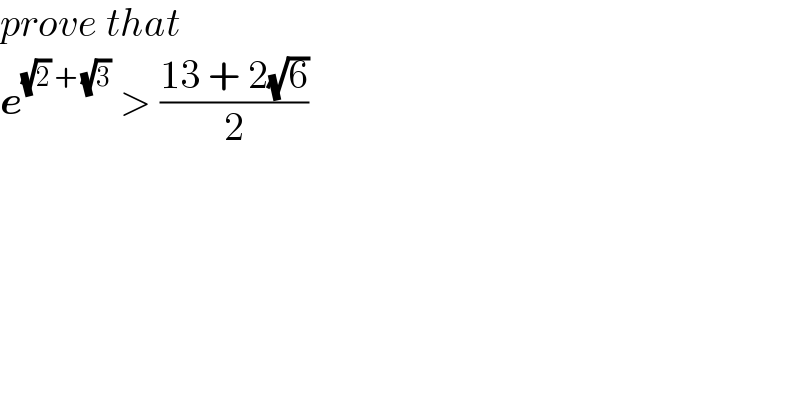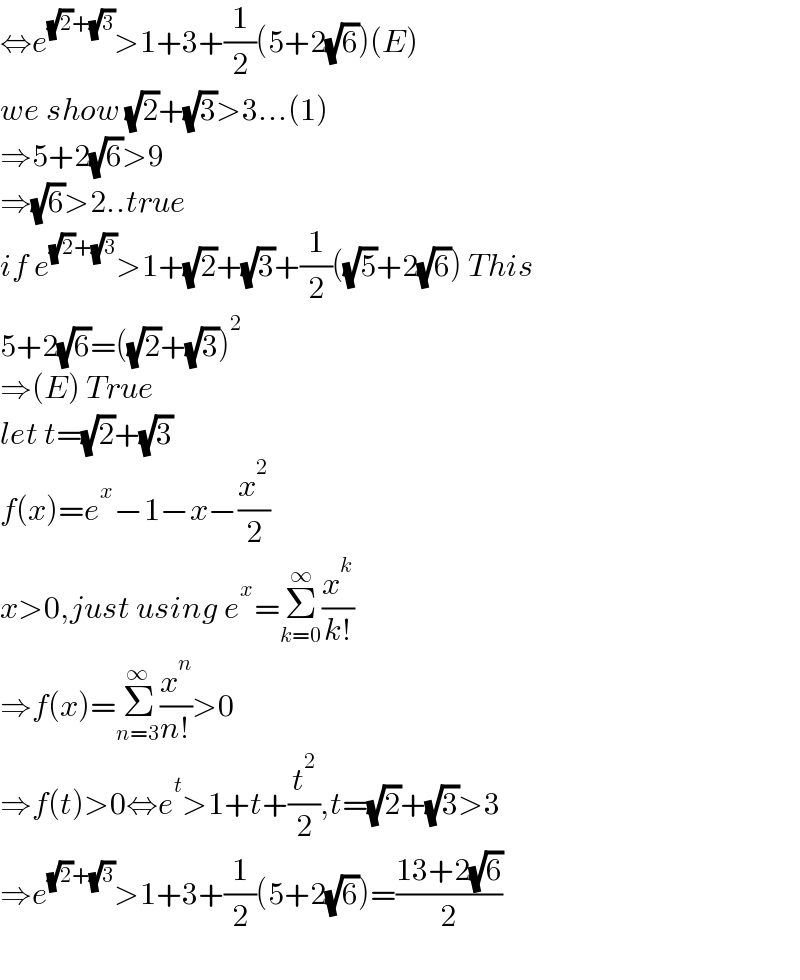
Question Number 147183 by mathdanisur last updated on 18/Jul/21

$${prove}\:{that} \\ $$ $$\boldsymbol{{e}}^{\sqrt{\mathrm{2}}\:+\:\sqrt{\mathrm{3}}} \:>\:\frac{\mathrm{13}\:+\:\mathrm{2}\sqrt{\mathrm{6}}}{\mathrm{2}} \\ $$
Answered by mindispower last updated on 18/Jul/21

$$\Leftrightarrow{e}^{\sqrt{\mathrm{2}}+\sqrt{\mathrm{3}}} >\mathrm{1}+\mathrm{3}+\frac{\mathrm{1}}{\mathrm{2}}\left(\mathrm{5}+\mathrm{2}\sqrt{\mathrm{6}}\right)\left({E}\right) \\ $$ $${we}\:{show}\:\sqrt{\mathrm{2}}+\sqrt{\mathrm{3}}>\mathrm{3}...\left(\mathrm{1}\right) \\ $$ $$\Rightarrow\mathrm{5}+\mathrm{2}\sqrt{\mathrm{6}}>\mathrm{9} \\ $$ $$\Rightarrow\sqrt{\mathrm{6}}>\mathrm{2}..{true} \\ $$ $${if}\:{e}^{\sqrt{\mathrm{2}}+\sqrt{\mathrm{3}}} >\mathrm{1}+\sqrt{\mathrm{2}}+\sqrt{\mathrm{3}}+\frac{\mathrm{1}}{\mathrm{2}}\left(\sqrt{\mathrm{5}}+\mathrm{2}\sqrt{\mathrm{6}}\right)\:{This} \\ $$ $$\mathrm{5}+\mathrm{2}\sqrt{\mathrm{6}}=\left(\sqrt{\mathrm{2}}+\sqrt{\mathrm{3}}\right)^{\mathrm{2}} \\ $$ $$\Rightarrow\left({E}\right)\:{True} \\ $$ $${let}\:{t}=\sqrt{\mathrm{2}}+\sqrt{\mathrm{3}} \\ $$ $${f}\left({x}\right)={e}^{{x}} −\mathrm{1}−{x}−\frac{{x}^{\mathrm{2}} }{\mathrm{2}} \\ $$ $${x}>\mathrm{0},{just}\:{using}\:{e}^{{x}} =\underset{{k}=\mathrm{0}} {\overset{\infty} {\sum}}\frac{{x}^{{k}} }{{k}!} \\ $$ $$\Rightarrow{f}\left({x}\right)=\underset{{n}=\mathrm{3}} {\overset{\infty} {\sum}}\frac{{x}^{{n}} }{{n}!}>\mathrm{0} \\ $$ $$\Rightarrow{f}\left({t}\right)>\mathrm{0}\Leftrightarrow{e}^{{t}} >\mathrm{1}+{t}+\frac{{t}^{\mathrm{2}} }{\mathrm{2}},{t}=\sqrt{\mathrm{2}}+\sqrt{\mathrm{3}}>\mathrm{3} \\ $$ $$\Rightarrow{e}^{\sqrt{\mathrm{2}}+\sqrt{\mathrm{3}}} >\mathrm{1}+\mathrm{3}+\frac{\mathrm{1}}{\mathrm{2}}\left(\mathrm{5}+\mathrm{2}\sqrt{\mathrm{6}}\right)=\frac{\mathrm{13}+\mathrm{2}\sqrt{\mathrm{6}}}{\mathrm{2}} \\ $$ $$ \\ $$
Commented bymathdanisur last updated on 19/Jul/21

$${thanks}\:{Ser}\:{cool} \\ $$
Commented bymindispower last updated on 19/Jul/21

$${withe}\:{pleasur} \\ $$
